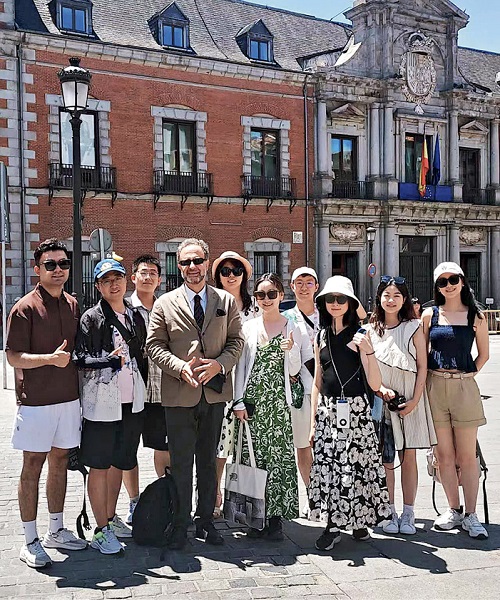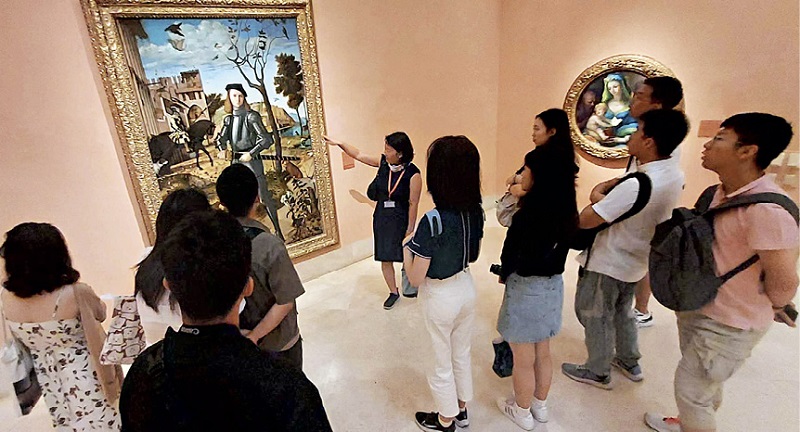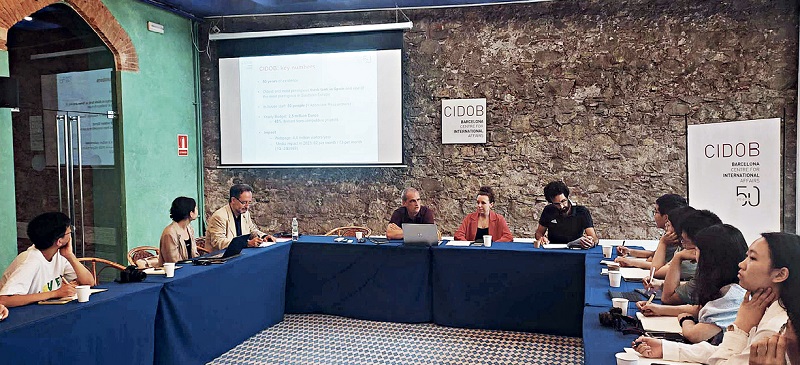
Tsinghua students take a group photo with the author Augusto Soto in front of the Santa Cruz Palace, headquarters of the Ministry of Foreign Affairs, European Union and Cooperation in Madrid.
With China and Spain celebrating 50 years of their diplomatic ties this year, a group of international relations students from Tsinghua University – President Xi Jinping’s alma mater – took on a two-week tour of Spain in July to ensure wider exposure and interaction for younger people. This year also marks the 110th anniversary of Tsinghua University. Meanwhile, the visit showed the keenness among Spanish VIP’s and prestigious local institutions to share experiences and views with the visitors.
In Madrid the students were received by Vicente López-Ibor Mayor, former Commissioner of Spain’s National Energy Commission and a founding partner of Abogados López-Ibor Mayor and Associates, specializing in international energy laws. López-Ibor Mayor spoke to the visitors about structuring and contracting large industrial projects in the renewable energy, electricity, and gas and oil sectors. He also touched upon climate change and new forms of production and consumption of electricity in a changing world and answered his audience’s questions on the prospects for China-Spain energy cooperation.
The students also talked with Pablo Rovetta, a Uruguayan entrepreneur and China specialist who had studied at Tsinghua University between 1978 and 1980. Rovetta shared his memories as a student in Tsinghua as well as photos of Tsinghua’s computer department classes in the 1970’s, handwritten lab reports, and graduation certificates. During the two-hour meeting, he also uttered his views on Spain-China relations, an update on the Belt and Road Initiative (BRI) from Eurasia’s western part, as well as from the Americas. The students, in turn, told him about the development of Tsinghua in recent years, the renovated facilities, its internationalization process and curricula.
A remarkable activity was the visit to the Thyssen-Bornemisza National Museum in Madrid, a jewel among European and Western museums, which was opened exclusively for the visitors from China for two hours on July 17. Evelio Acevedo, the managing director of the museum, explained the national and cosmopolitan character of Thyssen-Bornemisza. Acevedo had been in Shanghai in June to cut the ribbon for a special exhibition “The Greats of Six Centuries: Masterpieces from the Thyssen-Bornemisza National Museum,” at the Museum of Art Pudong in Shanghai. His introduction was followed by a Chinese-language tour guided by art specialized interpreter Zhang Jianfeng. She focused on the most outstanding masterpieces, such as Italian Renaissance artist Vittore Carpaccio’s Young Knight in a Landscape, fellow Italian Renaissance artist Domenico Ghirlandaio’s Portrait of Giovanna degli Albizzi Tornabuoni, and Vincent van Gogh’s Les Vessenots in Auvers, a landscape painting of Les Vessenots on the outskirts of Auvers in France.

The Tsinghua University delegation visiting the Thyssen-Bornemisza National Museum in Madrid in July 2023.
 The students also visited two other museums, the Prado Museum and the Reina Sofía National Museum in Madrid, which together with Thyssen-Bornemisza constitute the famous “Golden Triangle of Art” in the Spanish capital. The triangle is part of the “Paseo del Prado and Buen Retiro, a landscape of Arts and Sciences,” inscribed on UNESCO’s World Heritage List.
The students also visited two other museums, the Prado Museum and the Reina Sofía National Museum in Madrid, which together with Thyssen-Bornemisza constitute the famous “Golden Triangle of Art” in the Spanish capital. The triangle is part of the “Paseo del Prado and Buen Retiro, a landscape of Arts and Sciences,” inscribed on UNESCO’s World Heritage List.On July 18, the students enjoyed a unique and historical experience on the Yixinou China-Europe freight train at the arrival point of the Yiwu-Madrid railway line. In 2014, the Yixinou undertook an epic journey of more than 13,000 km from Yiwu in China to Madrid, completing it in 21 days.
At Adif-Abroñigal, the terminal in Madrid, Carlos Santana, former general manager of the Yixinou Spain, explained the significance of the venture in the context of Eurasian interactions. Personalized services give the train an advantage that most ships cannot offer. The relative paucity of air transport for cargo has made the train a factor in maintaining the stability of supply chains. The Yixinou represents a complement and alternative in international transport. Santana, now a Professor at IE Business School in Madrid, lived in Zhejiang and Shanghai from 2007 to 2017.
He called the Yixinou a symbol of peace through trade, propelling synergies and win-win cooperation for the many countries involved. The train is celebrating its 10th anniversary this year as part of the BRI projects.
The students’ next destination was the city of Barcelona, where Rafael Bueno, the Politics, Society and Education Department director of Asia House, a public diplomacy institution supported by the Spanish Ministry of Foreign Affairs and other institutions, explained Spain’s public diplomacy, particularly vis-à-vis Asian countries, as well as Asia House’s contributions in bringing the East and West closer. Asia House has been active for more than two decades in hosting round tables, fora, educational and people-to-people exchanges, exhibitions, and language teaching. China-related programs and events represent 50 percent of its activities.

At the Barcelona Centre for International Affairs, Tsinghua students participate in a meeting with Spanish scholars.
In Barcelona the students also paid a visit to Oriol Farres, project manager and International Yearbook coordinator of the Barcelona Centre for International Affairs, Spain’s oldest think tank (internationally known as CIDOB), which is also celebrating its 50th anniversary this year. Farres and other experts specializing in East Asia and Chinese politics as well as global geopolitics and security, briefed the Chinese visitors of the work of the think tank. The students were curious to learn about its agreements and academic exchange development with Chinese institutions. They also learned that Tsinghua’s Director of the Institute of International Studies Yan Xuetong had recently given a lecture at CIDOB’s annual most important event.
Another destination in Barcelona was the Confucius Institute, where Li Peihua, director of the institute, talked to the students about his organization’s activities, including signing agreements with universities and business schools in Spain to teach the Chinese language and culture.
One of the highlights in Barcelona was their meeting with Pedro Nueno, emeritus professor of entrepreneurship at the IESE Business School. Nueno is also the co-founder of the China Europe International Business School (CEIBS) in Shanghai.
Since the mid-80’s, he has been a key figure in EU-China relations, mobilizing resources and fostering high-level China-EU business interactions and people-to-people exchanges with China. Nueno spoke highly of China’s governance and its success in many fields and manifested his strong confidence in the future of China.
The hectic and fruitful Spain experience concluded with a visit to the Chinese Consulate in Barcelona, where the Consul General Zhu Jingyang spoke to the students about China-Spain relations and the many activities organized by the consulate in Barcelona, which hosts a vibrant entrepreneurial Chinese community. 
AUGUSTO SOTO is director of the Spain-based Dialogue with China Project.
